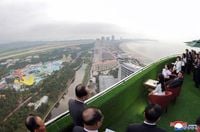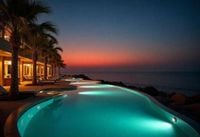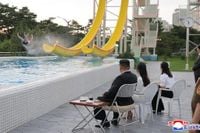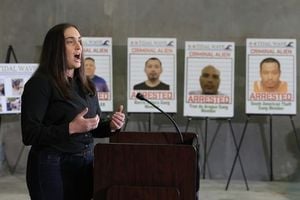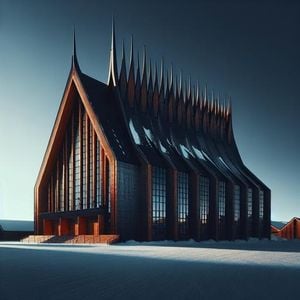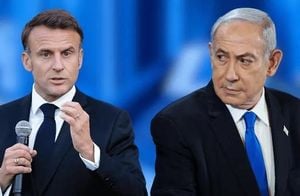North Korea has abruptly banned foreign tourists from its newly opened Wonsan-Kalma beach resort, a move that casts a shadow over the future of the ambitious project that leader Kim Jong Un once hailed as “one of the greatest successes this year.” The announcement, made via DPR Korea Tour — the country’s official tourism website — stated on July 16, 2025, that the resort is “temporarily not receiving foreign tourists,” though no explanation or timeline for the ban was provided.
The sprawling Wonsan-Kalma Coastal Tourist Zone stretches along 2.5 miles of pristine coastline on North Korea’s east coast. Designed to accommodate up to 20,000 guests, the resort boasts a range of amenities including hotels, water parks, a gym, and even a concert hall. Its development was a long-term project, initially slated to open in April 2019 but repeatedly delayed by international sanctions and the COVID-19 pandemic. Finally, it welcomed domestic tourists on July 1, 2025, and shortly thereafter, a small group of 15 Russian tourists visited the site during the week of July 7.
The visit of Russian Foreign Minister Sergey Lavrov on July 12-13 seemed to signal a new chapter for the resort’s international ambitions. Lavrov met with Kim Jong Un and Foreign Minister Choe Son Hui at the complex, and he pledged to support Russian travel to the area. “I am sure that Russian tourists will be increasingly eager to come here,” Lavrov said, expressing optimism about the resort’s potential to attract visitors from Russia. Lavrov’s presence was widely seen as a strategic showcase, with Kim calling him the resort’s “first foreign guest.” Russian foreign ministry spokesperson Maria Zakharova praised the resort as a “fantastic holiday destination” with “perfectly equipped facilities.”
Despite these optimistic overtures, the ban on foreign tourists followed soon after. Experts suggest that North Korea’s decision to halt foreign access may have been triggered by a critical article published by a Russian journalist who accompanied Lavrov. The report implied that many of the North Koreans seen at the resort were not genuine tourists but rather mobilized by authorities to create a staged scene. This revelation likely caused concern among North Korean officials about the image the resort would project to international visitors.
Oh Gyeong-seob, an analyst at Seoul’s Korea Institute for National Unification, told the Associated Press, “The North Korean government is believed to have determined that it would face some negative consequences when it opens the site to foreigners.” While Oh believes the ban encompasses Russian tourists as well, the North Korea-focused NK News website, citing tour groups specializing in North Korean travel, suggested Russians might not be targeted by the ban.
Another analyst, Lee Sangkeun of Seoul’s Institute for National Security Strategy, pointed to practical challenges in attracting Russian tourists, noting that “many would consider North Korea too far away and the trip too expensive.” This logistical hurdle could partly explain the sudden halt in foreign tourism to the resort.
Financially, the resort represents a major investment for North Korea, which faces tight budget constraints. Experts warn that the complex cannot sustain itself without foreign currency inflows from tourists, particularly from Russia and China, North Korea’s key ally. Ahn Chan-il, head of the World Institute for North Korean Studies in Seoul, emphasized the economic stakes: “If foreign tourists aren’t allowed to the site, no Russian rubles, Chinese yuans and dollars won’t come in. Then, North Korea can’t break even and it has to shut down the resort.”
Kim Jong Un has lauded the Wonsan-Kalma complex as “the proud first step” in developing the nation’s tourism industry, and state media reports that the site has been crowded with local visitors. However, the country has yet to fully reopen to international tourism. Chinese group tours, which accounted for more than 90% of visitors before the pandemic, remain stalled. Earlier this year, North Korea briefly allowed a small group of international tourists to visit the northeastern city of Rason, but that program was stopped in under a month.
While the resort’s opening was met with fanfare, including footage of Kim Jong Un enjoying the facilities poolside with his daughter Kim Ju Ae, the reality on the ground appears more complex. Satellite imagery analyzed by the 38 North program at the Stimson Center revealed that some major buildings, including a large hotel near the Kalmaegi Hotel, remain unused. The rooftop pool of that hotel has yet to be filled with water, and its name is missing from official maps of the area, suggesting ongoing construction or incomplete development.
Moreover, a Russian media report accompanying Lavrov’s visit claimed that locals had posed as tourists to create a lively atmosphere, while a journalist from Kommersant newspaper described the beach as largely deserted. This discrepancy between appearances and reality may have contributed to the decision to halt foreign access.
The resort’s history has not been without controversy. Campaigners have warned that the site was built using forced labor, raising ethical concerns about vacationing there. Greg Scarlatoiu, director of the Committee for Human Rights in North Korea, called the resort “morally and ethically wrong” and “truly an abomination.” He highlighted the risks faced by foreign visitors, citing the tragic case of Otto Warmbier, an American student detained for 17 months after a 2016 trip to Pyongyang.
North Korea’s tourism sector remains a complicated balancing act between economic necessity and political control. The government appears to be proceeding cautiously, prioritizing domestic visitors while reassessing how to safely and profitably open the resort to foreigners without jeopardizing its political interests.
With direct flights resuming between Russia and Pyongyang—Nordwind Airlines announced a route from Moscow starting later in July 2025—the potential for increased tourism exists. Yet, the suspension of foreign tourists at Wonsan-Kalma signals that North Korea is still navigating the challenges of reengaging with the global travel market amid ongoing sanctions, political sensitivities, and pandemic aftershocks.
For now, the future of the Wonsan-Kalma resort remains uncertain. Its success depends on North Korea’s ability to attract genuine foreign tourists, especially from Russia and China, and to manage the complex interplay of image, security, and economics. Until then, the expansive beachfront paradise will remain largely a domestic playground, with international visitors kept at bay.
